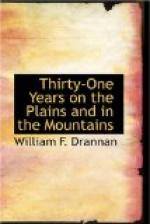Our men were well armed with such hand-guns as were then in existence. Some had squirrel rifles, others yager’s, shotguns and pistols. In fact, about all makes of firearms were represented in that emigrant train.
This was the first big band of hostile Indians that any of the people had ever seen, and Jim said there was the “wust” hubbub inside that corrall he had ever heard, notwithstanding he had cautioned them to be quiet.
The most nervous of the women, at sight of the Indians, commenced crying and screaming, while those more brave tried to reconcile those that were half frenzied from fright, and keep them quiet. Some were afraid to have their husbands stand outside the corrall for fear they would be killed by the redskins; but had it not been for that line of men standing on the outside of the wagons, and those scalps dangling from the wagon tongues all of which led the Indians to believe that the pale-faces were anxious to entertain them for awhile at least, they undoubtedly would have attacked that train that morning.
My assistants and I watched them all that day, and the train, after the Indians had gone, moved on. The Indians went back and took the trail of the nine scouts that they had sent out the morning before, tracked them to where their dead bodies lay, and taking four of the bodies with them, moved on eastward. We selected a high point and watched them until they had gone about ten miles, and then we turned and followed up the train, which camped that night at the head of Rock Creek. When we arrived and reported that the Indians had left the county they were the happiest lot of people I ever saw. It seemed that they thought this was the only band of Indians in the country.
The next day being Sunday Jim proposed that we lay over and rest, saying that he was about worn out himself and that he was satisfied that the scouts were in the same condition. This was satisfactory to all, so we did not move camp that day.
Up to this time we had not killed any game, although we had seen plenty, there being considerable buffalo in this part of the country yet, but it had been contrary to orders to shoot while traveling, and I want to say right here that the people of this train were always obedient to our orders during our travels with them.
I told them I would go out and kill a buffalo that day provided I could find one not too far from camp. A number of men in the train wanted to go with me for a buffalo hunt. “The more the merrier,” I said, so we and started, six of us together.
About two miles from camp we saw a band of fifteen that had not yet seen us. We at once dropped back over the hill and taking a circuitous route, we rode on the opposite side of them from camp, and cautiously to within about a hundred and fifty yards, when they raised their heads, took a good look at us and started off toward the train. I told Saunders as he was on a fast horse to take one side and I would




